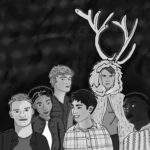NOTE: This post series may include spoilers from the Zaria Fierce Trilogy. If you hate spoilers, please read about the themes in Zaria Fierce after you have read the books.
The power of good plays a very important role in the Zaria Fierce Trilogy and is one of the trilogy’s core themes. It’s a beacon in the darkness; a guide to light the path of our bookish heroine, her friends, and readers.
The villain, Koll, is a dragon, and he is no friend. Dragons in the trilogy are a stand in for original evil. Koll, whose name literally means dark, is the first of all dragons. He represents the idea that there is something in the world that opposes God, good.
The power of dragons is animal magnetism, which can be best defined as mesmerism or hypnotism. It is a mere belief of power and not actual power. It is treachery, baseness, falseness, and evil. It would rob you of everything that makes you who you are and blind you to good.
Koll’s power, like all dragons, has no foundation or substance. He can only steal from others what they intentionally or unintentionally attributed to him. He can do this by subtle means as in the second book in the trilogy, where he influences Zaria’s thoughts and feelings, or overtly, as in the third book, where he transforms into his true form and uses it to intimidate Zaria.
To fight dragons you can neither be like them, for they are evil, nor can you use their weapons of deceit and trickery. You must recognize them in all their forms, and know who you are and hold to it. You can’t give into them or their suggestions, or you will be lost, blind, and left in darkness. It’s a miserable place to be as Zaria will tell you, because you will doubt yourself, your worth, your actions, and your heart.
Hector Woodworth explains best how you might recognize the differences in your heart compared to a dragon’s influence when taking to Zaria in the following scene from the third book:
“Princess,” Hector said, “Koll can’t take what you don’t give him. Remember his power is animal magnetism. It’s about convincing you he knows better, changing you into something else, and taking from you what you would not freely give. Know yourself and he will be unable to reach you. This is important. You can’t let him win.”
Zaria wanted to do that, but she wasn’t even fourteen yet. She didn’t know what she wanted to eat for breakfast from one day to the next, let alone know herself. It was too frustrating and impossible.
“How?” she demanded. “How do I do that?”
“Sometimes it’s easier to know what you’re not,” Hector said simply. “You’re not mean, or cruel, or evil, or guilty. You’re not prone to self-loathing.”
Every action has consequences. Zaria knows this because she’s experienced those consequences. To overcome past mistakes, she must be attentive and alert to the dangers around her. She must be her truest self and express it thoroughly to defeat Koll. This is no easy task or lesson to learn. So it is for those who dare to confront dragons that they will find the very best in themselves.
It is my hope that readers will gain a little of Zaria’s strength and take it with them when they leave the books to return to their daily lives. Everyone deserves to be a dragon slayer, to know they possess that bravery inside them, and can conquer all fear, obstacles, and opposition with kindness and love… and perhaps, just a little bit of magic.
Thus it is that good must win over evil, love over hatred, truth over error. Now and always.






